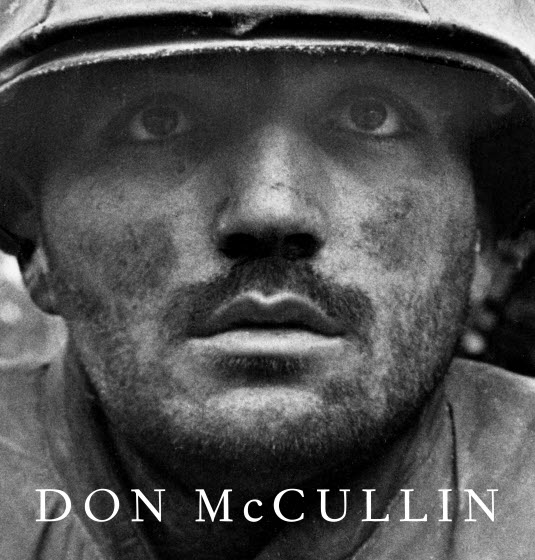This is not a war book per se and it is certainly not a history book, so you might ask why is it being reviewed here. Deciding to write about this book is more than just a slice of indulgence for me. I accept my professional background drives me to review a book that happens to include many images of war by one of the greatest photographers of the past half-century. But the way war is recorded is massively important whether it is in straight documentary style or through the visions of movie directors. The connection between the work in this book and the imagery of Francis Ford Coppola or David Ayer is tangible. I have never met Don McCullin but I have handled his work. Being a career long devotee of photography I have been fortunate to deal with the work of other greats. Only a few weeks ago I was looking through prints by Henri Cartier-Bresson. I mention this to confirm my love for the media. Photography has been a major aspect of my life and I am so glad.
Don McCullin is a north London lad like me and he grew up a short bus ride from where I was raised. I feel a strong connection with his London photography because so much of it is from places I knew as a youngster and although almost everyone is fixated on his work in Vietnam, his photography in Islington and in the East End is really close to home. I was lucky to have parents who always worked but in the1960s and early 1970s we knew people who were used to poverty and very often the casual violence and indifference associated with it. Mr McCullin’s Chapel Market scenes are real to me and it is a sobering thought that my Barnes descendants knew those same streets as far back as the 1750s. Much of working class London is going through a gentfrification that dismays many people, but all the childhood friends I keep in touch with do not live in London any more and the character of old haunts has inevitably changed. His views of skinheads fighting on Southend seafront take me full circle. I feel like I have been following Mr McCullin about in some ways but he has been working all my life.
I think it is entirely right to have mentioned all this to set in context what Don McCullin experienced and photographed in Vietnam, Cyprus, Biafra and the Lebanon. His war photography is awe-inspiring because it shows so much life. That the life he pictured was often terrifying and tragic is the basis of me making the point. Perhaps this is all in danger of getting too deep. But you can look at his photographs and see so much more than the details of first impressions. To lighten the load a bit I remember an early visit to The Times Picture Library at Wapping where one of Mr McCullin’s shots of sullen men sitting on the deck of an M113 was one of the few framed images on the wall. I used to look at that picture troubled by something, and it wasn’t anything emotional about the experiences of those brooding men. It took a while to realise the image had been printed back to front.
When I first joined the staff of a newspaper picture library a very long time ago there was a kind of initiation ceremony where an old hand showed me grizzly photographs in the hope of an adverse reaction. I had to look at a sequence of images of men being burned with cigarettes and bayonetted to death in Bangladesh by a leering group of killers. The photography (not by Don McCullin as it happens) was first rate but the fact is there was something missing – there was no sense of drama. The pictures were just too straight for me.
I still can’t put my finger exactly what I mean by that after all these years.
It is highly probable you will learn much more about the Vietnam War from the stunning Associated Press photo history published two years ago. But if you place that book alongside Mr McCullin’s work in this anthology, you will see a real connection. I am a massive admirer of British press photographers of World War II but the wider international story of all war photographers is deeply fascinating to me. I once knew a snapper who had been in Bosnia and he was haunted by it. Another who had seen horrible things during the first Gulf War gave the impression it was all a bit of a hoot. I suppose this shows the different way wars impact on people. Some can take it and some can’t. Having never done it I make no judgement.
This huge and impressive book is the latest edition of a classic that includes forty unpublished images and a new introduction. Don McCullin is now eighty years old and he continues to enjoy landscape photography and other work. His images of places like the Somerset Levels look like a different kind of war zone – the one against the elements. His work with distant tribal communities brings me back to my point about life. This book is a celebration of life – however squalid and scary it often is.
Reviewed by Mark Barnes for War History Online.
DON McCULLIN
The New Definitive Edition
Published by Jonathan Cape
ISBN: 9781910702017
